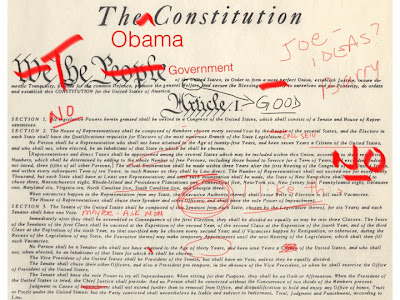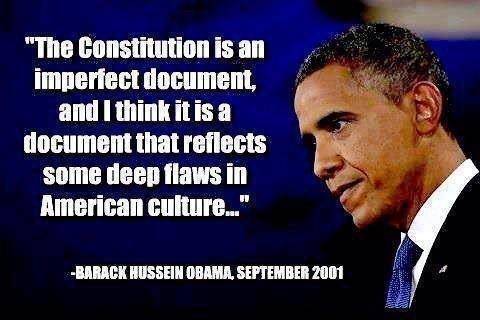- May 17, 2013
- 67,505
- 32,631
- 2,290
Has Obama Violated the Constitution by Delaying Deportation.
Follow along with the video below to see how to install our site as a web app on your home screen.

Note: This feature currently requires accessing the site using the built-in Safari browser.


I agree..............I don't know much about politics but what I do know is every time Obama bypasses Congress he bypasses WE THE PEOPLE. We put these people in office to represent us and what we want done. If Obama fails to respect that what is the point of having congress in the first place? If he disagrees with what they decide he just does what he wants by executive order? I ask again, whats the point of having congress in the first place. This is no better than the policies of the USSR in the cold war when you had one choice on the ballot and you voted in favor of the one option or got sent to Siberia. Seems the Obama is saying the only option is what he says it is. He's acting like a dictator.





We've tried amnesty once already, it failed.
The Immigration Reform and Control Act (IRCA), Pub.L. 99–603, 100 Stat. 3445, enacted November 6, 1986, also known as the Simpson-Mazzoli Act, signed into law by Ronald Reagan on November 6, 1986, is an Act of Congress which reformed United Statesimmigration law. The Act[1]
At the time, the Immigration and Naturalization Service estimated that about four million illegal immigrants would apply for legal status through the act and that roughly half of them would be eligible.[2]
- required employers to attest to their employees' immigration status;
- made it illegal to hire or recruit illegal immigrants knowingly;
- legalized certain seasonal agricultural illegal immigrants, and;
- legalized illegal immigrants who entered the United States before January 1, 1982 and had resided there continuously with the penalty of a fine, back taxes due, and admission of guilt; candidates were required to prove that they were not guilty of crimes, that they were in the country before January 1, 1982, and that they possessed minimal knowledge about U.S. history, government, and the English language.
Immigration Reform and Control Act of 1986 - Wikipedia the free encyclopedia

You mean the Obama Heathcare plan forced on American people that he spent oddles of money on and it still sucked? I think he'd understand someone trying to stop what they thought was a violation of the Constitution and what they correctly predicted to be a major fail no matter what it took even if it was in vain.We've tried amnesty once already, it failed.
The Immigration Reform and Control Act (IRCA), Pub.L. 99–603, 100 Stat. 3445, enacted November 6, 1986, also known as the Simpson-Mazzoli Act, signed into law by Ronald Reagan on November 6, 1986, is an Act of Congress which reformed United Statesimmigration law. The Act[1]
At the time, the Immigration and Naturalization Service estimated that about four million illegal immigrants would apply for legal status through the act and that roughly half of them would be eligible.[2]
- required employers to attest to their employees' immigration status;
- made it illegal to hire or recruit illegal immigrants knowingly;
- legalized certain seasonal agricultural illegal immigrants, and;
- legalized illegal immigrants who entered the United States before January 1, 1982 and had resided there continuously with the penalty of a fine, back taxes due, and admission of guilt; candidates were required to prove that they were not guilty of crimes, that they were in the country before January 1, 1982, and that they possessed minimal knowledge about U.S. history, government, and the English language.
Immigration Reform and Control Act of 1986 - Wikipedia the free encyclopedia

I'm really impressed with that Einstein quote. What do you think he would have said about teabaggers in the house voting 50 times to end healthcare?
You mean the Obama Heathcare plan forced on American people that he spent oddles of money on and it still sucked? I think he'd understand someone trying to stop what they thought was a violation of the Constitution and what they correctly predicted to be a major fail no matter what it took even if it was in vain.We've tried amnesty once already, it failed.
The Immigration Reform and Control Act (IRCA), Pub.L. 99–603, 100 Stat. 3445, enacted November 6, 1986, also known as the Simpson-Mazzoli Act, signed into law by Ronald Reagan on November 6, 1986, is an Act of Congress which reformed United Statesimmigration law. The Act[1]
At the time, the Immigration and Naturalization Service estimated that about four million illegal immigrants would apply for legal status through the act and that roughly half of them would be eligible.[2]
- required employers to attest to their employees' immigration status;
- made it illegal to hire or recruit illegal immigrants knowingly;
- legalized certain seasonal agricultural illegal immigrants, and;
- legalized illegal immigrants who entered the United States before January 1, 1982 and had resided there continuously with the penalty of a fine, back taxes due, and admission of guilt; candidates were required to prove that they were not guilty of crimes, that they were in the country before January 1, 1982, and that they possessed minimal knowledge about U.S. history, government, and the English language.
Immigration Reform and Control Act of 1986 - Wikipedia the free encyclopedia

I'm really impressed with that Einstein quote. What do you think he would have said about teabaggers in the house voting 50 times to end healthcare?
Has Obama Violated the Constitution by Delaying Deportation.
I'll rephrase the question then. Is he in violation of his oath of office and duties as the President by not enforcing the laws of this land?Has Obama Violated the Constitution by Delaying Deportation.
By ignoring 5,000,000 illegals, perhaps. I can't answer that question. But I know h's violating the Constitution by granting work permits.